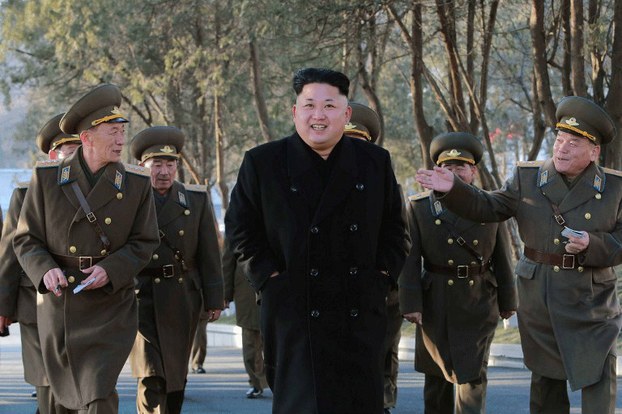Report calls for US to return North Korea to list of state sponsors of terrorism
| Publisher | Radio Free Asia |
| Publication Date | 27 April 2015 |
| Cite as | Radio Free Asia, Report calls for US to return North Korea to list of state sponsors of terrorism, 27 April 2015, available at: https://www.refworld.org/docid/555edb41e.html [accessed 26 May 2023] |
| Disclaimer | This is not a UNHCR publication. UNHCR is not responsible for, nor does it necessarily endorse, its content. Any views expressed are solely those of the author or publisher and do not necessarily reflect those of UNHCR, the United Nations or its Member States. |
2015-04-27
By Joshua Lipes
 North Korean leader Kim Jong Un (C) during an inspection of a military command at an undisclosed location in an official photo released Jan. 13, 2015. AFP/KCNA via KNS
North Korean leader Kim Jong Un (C) during an inspection of a military command at an undisclosed location in an official photo released Jan. 13, 2015. AFP/KCNA via KNS
Recent conduct by North Korea – including the sale of weapons to terrorist groups, targeting of defectors and South Korean rights activists, and making threats to global freedom of expression – justifies its return to the U.S. list of state sponsors of terrorism (SSOT), a new report said Monday.
North Korea was removed from the SSOT in 2008 amid efforts by then-U.S. President George W. Bush to engage the reclusive state in talks, and the U.S. maintains that the North has not sponsored any terrorist acts since the bombing of a Korean Airlines flight in 1987.
But in a report written for the Committee for Human Rights in North Korea (HRNK), North Korea watcher Joshua Stanton said the legal standards for listing a state as a sponsor of terrorism are "vague and inconsistent," and that the U.S. State Department's reporting on terrorism has "not always conformed to these standards."
Additionally, some of the consequences of a SSOT re-listing would be "legally and financially significant," said the report, entitled "Arsenal of Terror," adding that evidence of North Korea's recent sponsorship of terrorism is both "extensive and consistent with the applicable legal standards and precedents cited to justify previous SSOT listings."
The U.S. currently lists Iran, Syria, Sudan and Cuba as state sponsors of terrorism, but is expected to remove Cuba amid a mending of ties between the two nations.
HRNK Executive Director Greg Scarlatoiu said in a statement that since 2008, North Korea has "increased its use of terrorism as an instrument of state policy, and also appears to have increased its material support for designated terrorist organizations."
The report cites evidence which it said "suggests that North Korea began to expand its sponsorship of terrorism significantly shortly before its removal from the SSOT list in 2008."
Such sponsorship involves the sale or transfer of weapons to foreign terrorist organizations, including groups backed by Iran, such as Hezbollah and Hamas, the report said, based on North Korean caches seized from cargo ships in recent years.
Other incidents include threats to North Korean émigrés and refugees, as well as to South Korean human rights activists, who have become targets for kidnapping and assassination by agents from the North, it said.
North Korean sponsorship of terrorism has also involved threats to global freedom of expression, the report said, citing 35 suspected state-sponsored cyberattacks in 2009 against U.S., South Korean and commercial websites, as well as one last year against Sony Pictures, which delayed the company's plan to release a film satirizing the North.
The report also referred to "a growing threat to the safety of South Korea's civilian population" from the North since 2008.
"Although other provocative and even violent conduct by Pyongyang involving South Korea and other countries may not fit the strict legal definitions of international terrorism, it raises concerns related to the sponsorship of terrorism, and calls for appropriate legal options as well," the report said.
The report recommended that Congress and the U.S. State Department clarify the legal standards that define state sponsorship of terrorism and consider re-listing North Korea as a SSOT based on the evidence it presented.
It also called for the creation of remedies for "serious threats" that do not meet the legal definition of support for acts of terrorism, and a reconsideration of whether sanctions associated with a SSOT listing can sufficiently deter states from sponsoring terrorism.
Link to original story on RFA website
